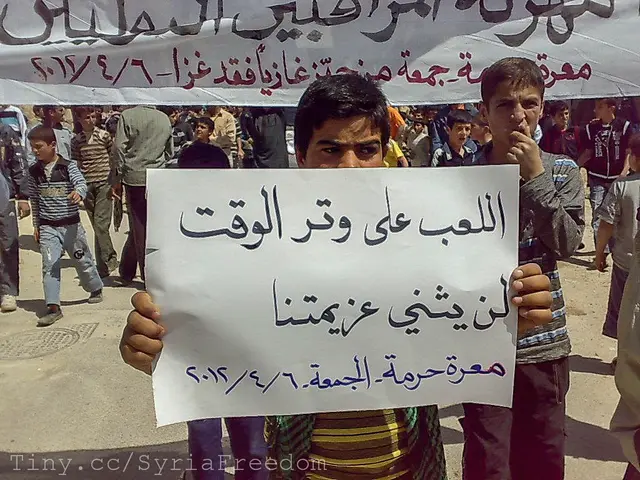Arabic countries express dispute over Netanyahu's comments addressing 'Expanded Israel'
In a recent interview, Israeli Prime Minister Benjamin Netanyahu expressed his support for the idea of an expanded "Greater Israel," a move that has sparked significant diplomatic backlash, particularly from Arab nations.
The United Arab Emirates (UAE) has strongly condemned Netanyahu's endorsement of an expansionist vision tied to "Greater Israel," denouncing it as a threat to Arab sovereignty and regional stability. Qatar, acting as a mediator, decried Netanyahu's statements, calling them "absurd" and "inflammatory." Jordan, Saudi Arabia, and Iraq have also expressed outright outrage and swift condemnation of Netanyahu's statements, viewing them as provocative and destabilizing.
The term "Greater Israel" refers to a biblical interpretation of Israel's territory, encompassing parts of modern Jordan, Lebanon, Syria, Gaza, and the occupied West Bank. Netanyahu's self-presentation as the primary decision maker in Israeli foreign policy and his framing of the Greater Israel idea reflect a controversial policy direction garnering significant pushback globally.
Israeli Prime Minister Netanyahu's comments on Greater Israel were criticized as a threat to the sovereignty of states by Arab nations. Jordan's foreign ministry spokesman rejected Netanyahu's inflammatory rhetoric and delusional claims. Saudi Arabia reiterated the historical and legal right of the Palestinian people to establish their independent state. Iraq's foreign ministry condemned Netanyahu's remarks, stating they reveal Israel's "expansionist ambitions" and are a "clear provocation to the sovereignty of countries."
The international community's response to Netanyahu's comments supporting an expanded "Greater Israel" has been largely one of condemnation and concern. Egypt requested clarification on Netanyahu's Greater Israel remarks, characterizing it as a rejection of the option of peace in the region. The government's recent approval of a rash of new settlements in the West Bank, considered illegal under international law, has further fuelled these concerns.
Past calls to resettle Gazans outside of the war-battered territory, including from US President Donald Trump, have sparked fears of displacement among Palestinians and condemnation from the international community. Ultra-nationalist Israelis have called for the occupation of these territories, while far-right members of Netanyahu's cabinet are demanding the conquest of Gaza and annexation of the West Bank.
The 22-month war between Israel and the Palestinian group Hamas in the Gaza Strip has repeatedly spilled over into the wider Middle East. The repeated escalation of conflict and the threat to peace in the region have led many to view Netanyahu's vision for Greater Israel as a dangerous and destabilizing prospect.
In summary, Netanyahu’s comments have sparked significant diplomatic backlash, particularly from Arab nations, reinforcing existing tensions over Israel’s territorial policies and worsening prospects for a negotiated peace. The international community has expressed concern and condemnation over Netanyahu's vision for Greater Israel, viewing it as a threat to regional stability and a dangerous escalation of the ongoing conflict.
Read also:
- Weekly happenings in the German Federal Parliament (Bundestag)
- Southwest region's most popular posts, accompanied by an inquiry:
- Discussion between Putin and Trump in Alaska could potentially overshadow Ukraine's concerns
- Massive 8.8 earthquake hits off the coast of Russia's Kamchatka Peninsula, prompting Japan to issue a tsunami alert.








